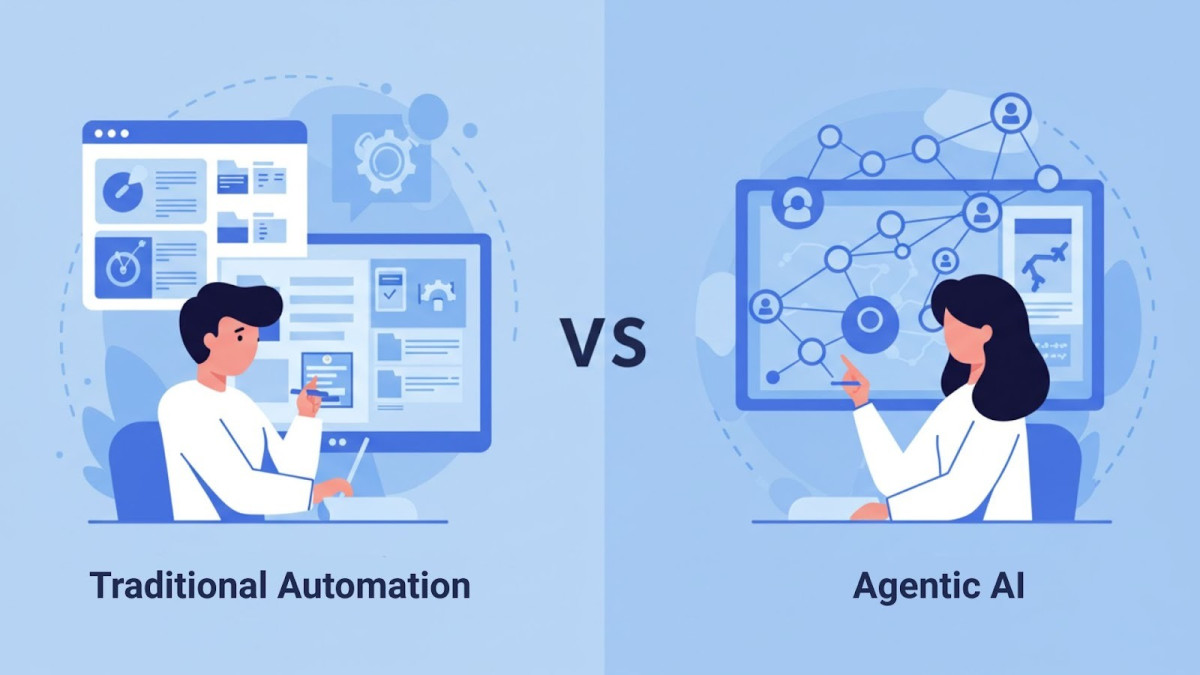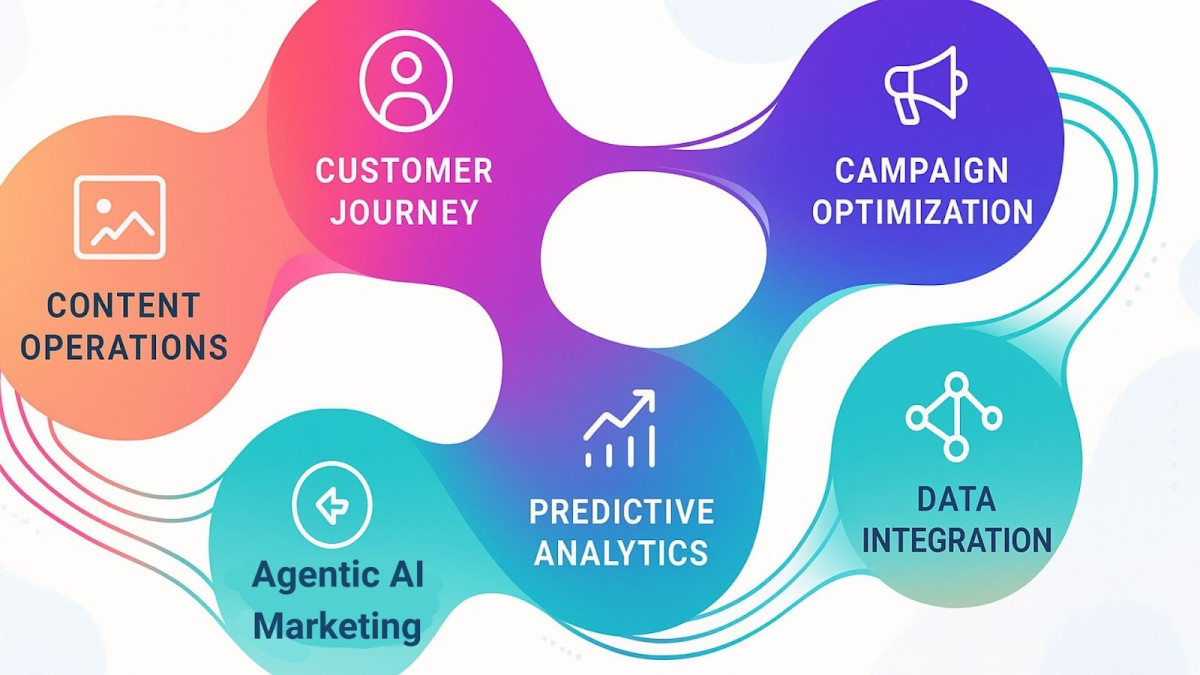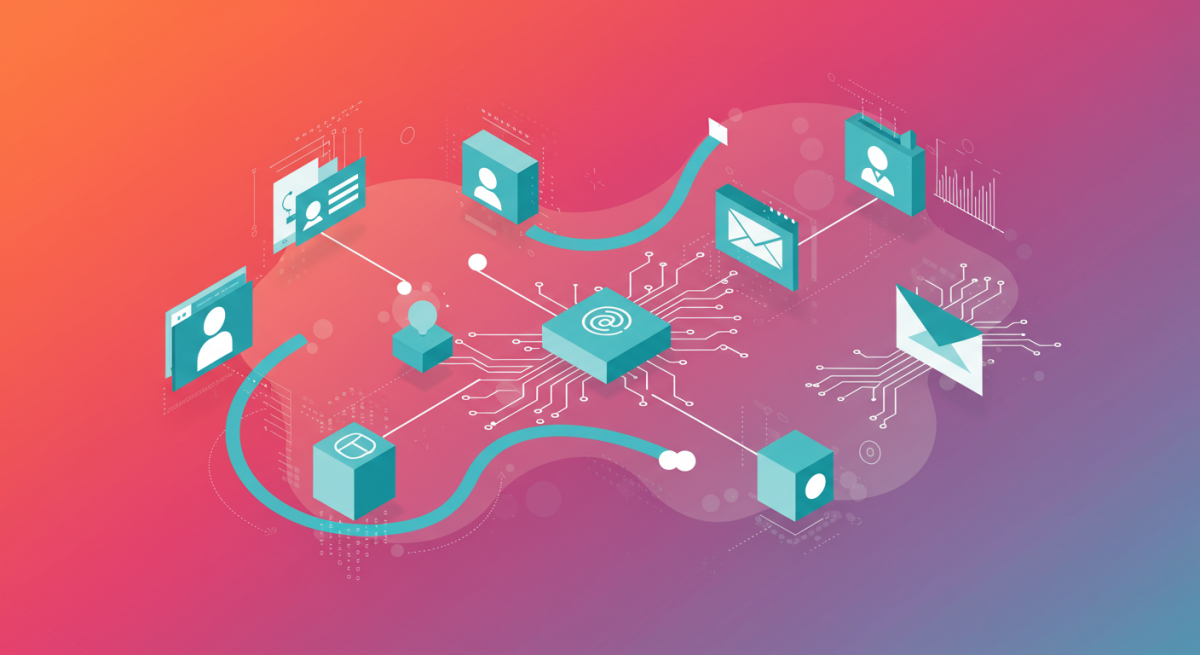How AI Agents Are Reshaping Marketing Workflows
Chicago, United States - October 13, 2025 / Aprimo /
From Task Automation to Strategic Orchestration: The Pivot Point for Agentic Marketing Technology
AI agents are changing how marketing teams operate, moving beyond simple task automation to autonomous workflow orchestration. Organizations implementing AI agents report productivity increases and more strategic focus. Key transformations include real-time campaign optimization, predictive planning, and dynamic customer journey management. Start with pilot implementations in content operations and campaign optimization to build confidence and demonstrate measurable ROI.
Marketing leaders have been hearing promises about AI transformation for years, but 2025 represents something different entirely. While 89.5% of marketers already use some form of AI in their processes, only 24% have adopted agentic AI workflow tools that can autonomously manage complex marketing operations.
The distinction matters more than you might think. Traditional marketing automation follows predefined rules and workflows. Agentic AI, however, can analyze data, make decisions, and adapt strategies in real time without human intervention. Companies using advanced AI agents report dramatic improvements in both efficiency and campaign effectiveness, suggesting we're finally moving from AI experimentation to execution.
What makes this shift compelling for marketing organizations is how it's reshaping roles rather than eliminating them. Marketing professionals are discovering that AI workflow technology doesn't replace strategic thinking. Instead, it amplifies it by handling the operational complexity that previously consumed so much bandwidth.
What Makes Agentic AI Different from Traditional Marketing Automation?
Marketing technology has been dominated by rule-based automation for over a decade. You set up an email sequence, define trigger conditions, and the system executes accordingly. But what happens when market conditions change, customer behavior shifts, or new opportunities emerge between your scheduled optimization reviews?

Agentic AI workflow tools operate differently. Instead of following predetermined paths, they continuously evaluate goals, analyze performance data, and adjust tactics autonomously. Traditional automation might send a follow-up email three days after a prospect downloads a whitepaper. In contrast, an AI agent might analyze that prospect's recent website behavior, social media engagement, and company news to determine the best timing, messaging, and channel for the next interaction.
Gartner predicts that 33% of enterprise software will incorporate agentic AI capabilities by 2028. This pivotal point isn't gradual adoption; it's a complete shift in how marketing technology works.
While traditional systems require humans to interpret data and adjust campaigns, agentic systems can evaluate campaign performance, identify optimization opportunities, and implement changes within minutes rather than days or weeks.
How Are Marketing Roles Evolving with Autonomous AI Systems?
What's most surprising is that marketing teams aren't shrinking but reorganizing. Companies implementing AI agents report that while routine task execution becomes automated, demand for strategic thinking, creative problem-solving, and AI oversight actually increases.
Marketing roles are evolving into two distinct categories: strategic orchestrators and specialist creators. Strategic orchestrators focus on goal-setting, performance interpretation, and cross-functional collaboration. They work with AI agents to define objectives, establish guardrails, and ensure alignment with broader business goals. Specialist creators concentrate on brand positioning, creative concept development, and customer experience design.
This reorganization delivers measurable results. Companies implementing AI agents see an average 35% increase in productivity, but marketing automation isn't just about doing the same work faster. Implementing AI allows marketing teams to tackle more complex initiatives.
Take content operations as an example. Instead of spending hours scheduling social media posts, reviewing campaign metrics, and adjusting ad spend, marketing professionals can focus on audience research, competitive analysis, and content lifecycle management while AI agents handle execution and optimization.

The evolution requires new competencies, particularly in AI collaboration and data interpretation. Marketing professionals need to understand how to set effective parameters for AI agents, interpret their recommendations, and recognize when human intervention is necessary.
What Tasks Are AI Agents Automating in Marketing Workflows?
Let's move beyond theoretical benefits and examine specific workflow transformations happening right now across marketing organizations.
1. Content Operations and Distribution
AI agents are impacting how content moves through creation, approval, and distribution cycles. They can analyze performance data from previous campaigns, identify content gaps, and automatically generate briefs for creative teams. More sophisticated implementations coordinate content across multiple channels, adjusting messaging and timing based on audience engagement patterns.
2. Customer Journey Orchestration
Unlike traditional marketing automation that creates linear customer journeys, AI agents create dynamic, responsive experiences that adapt based on individual behavior. They identify when prospects show buying signals, recognize declining engagement, and automatically adjust touchpoint frequency and messaging tone without waiting for scheduled reviews.
3. Campaign Performance Optimization
AI agents continuously monitor campaign metrics and make real-time adjustments rather than waiting for monthly performance reviews. They reallocate budget between ad platforms, adjust targeting parameters, and modify creative elements based on performance data while campaigns are still running.
4. Predictive Analytics and Planning
Beyond reporting what happened, AI agents excel at forecasting what will happen. They identify seasonal trends, predict customer lifetime value, and forecast campaign performance before launch. Marketing teams can make proactive rather than reactive decisions.
5. Cross-Platform Data Integration
Marketing organizations typically juggle data from multiple platforms, such as CRM systems, advertising platforms, analytics tools, and social media channels. AI agents can synthesize this information, identify correlations, and surface insights that might be missed in siloed analysis. This capability becomes particularly valuable when implementing comprehensive personalization strategies that require coordination across multiple touchpoints.
The result is marketing operations that feel more intentional. Teams report feeling more in control of their campaigns and better able to demonstrate ROI to executive leadership.

How Should Organizations Implement Agentic AI Without Disrupting Existing Operations?
Actual implementation often looks different from vendor demonstrations. The most successful deployments follow a deliberate, measured approach that builds organizational confidence while delivering tangible results.
Start with pilot programs focused on specific workflow challenges rather than attempting comprehensive changes. Content scheduling and basic campaign optimization represent ideal starting points because they're contained, measurable, and directly impact daily operations. Success in these areas builds internal advocacy for broader implementation.
ROI measurement becomes vital for securing ongoing support and budget allocation. Research from Alvarez & Marsal indicates that early enterprise deployments yield up to 50% efficiency improvements in customer service and sales. However, marketing ROI requires more nuanced measurement focusing on campaign performance, content velocity, and strategic initiative completion rather than simple cost reduction.
Establish clear governance frameworks. Who can modify AI agent parameters? How are performance thresholds established? What triggers require human review? These details determine whether AI agents become valuable team members or sources of confusion and frustration.
What Does the Marketing Organization of 2025 Look Like?
McKinsey research suggests that while 92 million jobs may be displaced by AI adoption through 2030, 170 million new roles will emerge. Marketing teams are becoming more specialized and strategic. Agent productivity improvements enable smaller teams to manage larger, more complex campaigns. But this efficiency comes with higher expectations for strategic thinking, creative innovation, and business impact.
AI collaboration as a core marketing skill is reshaping hiring and development priorities. Marketing professionals who can effectively work with agentic AI workflow tools, interpret their insights, and guide their development become increasingly valuable.
Forward-thinking marketing leaders are already preparing for this future by investing in training programs, updating job descriptions, and redesigning performance metrics to reflect human-AI collaboration rather than individual output.
The organizations that thrive in this environment will be those that view marketing automation AI not as a replacement for human creativity but as a foundation that enables more ambitious, impactful marketing strategies.
Frequently Asked Questions
How do AI agents differ from chatbots in marketing applications? While chatbots respond to specific inputs with predetermined outputs, AI agents can analyze data from multiple sources, make autonomous decisions, and execute complex multi-step workflows. They operate more like digital marketing coordinators than simple response systems.
What's the typical implementation timeline for agentic AI in marketing workflows? Most organizations see initial results within several weeks for focused applications like content scheduling or basic campaign optimization. Comprehensive workflow transformation requires several months to over a year, depending on existing technology infrastructure and team readiness.
How do marketing teams measure success with AI agent implementations? Effective measurement combines efficiency metrics (time saved, task automation) with performance improvements (campaign optimization, content velocity, lead quality). The most successful implementations focus on strategic outcome improvements rather than simple cost reduction.
Do AI agents require completely new marketing technology stacks? No. The most effective AI agents integrate with existing CRM systems, marketing automation platforms, and analytics tools rather than replacing them. Look for solutions that enhance your current technology investments through robust API connectivity and pre-built integrations.
From Experimentation to Execution: The Strategic Imperative
The transformation is already underway. AI agents are already reshaping marketing workflows, but how quickly can your organization adapt to leverage their capabilities? For marketing leaders ready to move beyond experimentation and into execution, solutions like Aprimo's AI-powered content operations platform offer the sophisticated workflow orchestration and intelligent automation needed to compete.

Contact Information:
Aprimo
230 W Monroe Street, Suite 1200
Chicago, IL 60606
United States
Aprimo Support
https://www.aprimo.com/


